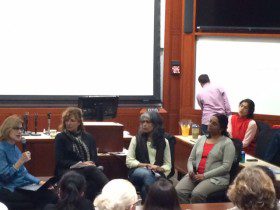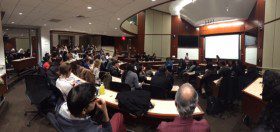By Divya S. Sooryakumar, International Education Policy, Ed.M Candidate, Harvard Graduate School of Education
On March 26th, the Harvard South Asia Institute screened the controversial BBC documentary India’s Daughter, by Leslee Udwin. The film captures the story of the brutal rape and murder of a young medical student on a bus in Delhi in December 2012. Banned by the Indian Government, the film has raised questions about India’s attitude towards gender violence.
In order to address these questions, a panel discussion followed the screening, which examined the documentary and the ban by Indian Government through the lens of the law, the media, and gender.
The panel, moderated by Dr. Jacqueline Bhabha, FXB Director of Research, Professor of the Practice of Health and Human Rights, Harvard School of Public Health, Jeremiah Smith, Jr. Lecturer in Law, Harvard Law School, Adjunct Lecturer, Harvard Kennedy School and featured Lakshmi Iyer, Associate Professor of Business Administration, Harvard Business School, Diane Rosenfeld, Lecturer on Law and Director of the Gender Violence Program, Harvard Law School and Beena Sarwar, Editor, Aman ki Asha, Jang Group Pakistan; former Nieman Fellow and Fellow at the Carr Center for Human Rights Policy, Harvard Kennedy School.
Dr. Bhabha opened the panel by sharing the official reason that this film was banned in India, as the government felt portions of the film “…appear to encourage and incite violence against women.” She then gave a brief history of censorship in India that started as early as the 1930s, when a book decrying Hinduism was banned by the government.
 Lakshmi Iyer discussed the “rays of hope” that we must all find in order to make change towards a better India. She focused on the political and economic empowerment of women as agents of change. Iyer dove into the widespread silence that surrounds issues of gender violence in India and hypothesized that helping women find their voice and teaching society to listen is a critical step towards progress for India.
Lakshmi Iyer discussed the “rays of hope” that we must all find in order to make change towards a better India. She focused on the political and economic empowerment of women as agents of change. Iyer dove into the widespread silence that surrounds issues of gender violence in India and hypothesized that helping women find their voice and teaching society to listen is a critical step towards progress for India.
Dr. Rosenfeld, rooted her comments in biological theory, focusing on the evolution of patriarchy by explaining that the origins of human sexual violence were rooted in males sexually coercing females for power.
Beena Sawar spoke about the media coverage of the rape and the protests. The media largely ignores the rural gender violence cases. Additionally, the media not only dramatizes issues but also de-contextualizes them. She ended with the thought-provoking comment, “the media covers events and not their processes.”
Dr. Bhabha opened up the floor to questions from the audience that ranged from questions about ways to share the film, the rape case itself, the role of the media and education, and finally questions about ending gender violence. The panelists’ responses highlighted the fact that gender violence is not just a problem in India, but rather it is a global problem. By highlighting the global culture of victim-blaming and shaming, it was clear that there are still many strides that must be made to end gender violence.
The event was jointly organized by SAI and the India Caucus at HKS, and co-sponsored by the South Asia Caucus, the Human Rights PIC, the Gender Consortium and the Criminal Justice PIC.
#IndiasDaughter was banned (yes, banned) in India. Thank you @HarvardSAI for screening it tonight in Cambridge. http://t.co/2k5lR14uxh
— Ashish K. Jha (@ashishkjha) March 26, 2015
@HarvardSAI thank you for the screening… trying to gather my thoughts now after feelings of horror, revulsion, and anger #IndiasDaughter
— Colombine (@c0l0mbine) March 27, 2015

